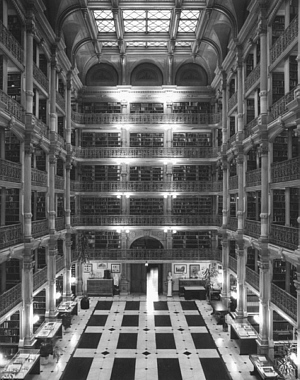|
|
New Life for Rare Books at George Peabody LibraryBeautiful but problematic reading room to get new heating, air conditioning
|

The George Peabody Library, home to more than 300,000 books that date as far back as the 15th century, has received a $325,000 Save America's Treasures grant to improve the library's ability to preserve its rich and unique research collection.
The money will be spent to upgrade and modernize the heating and air conditioning system in the historic library, which opened in 1878. Though its striking atrium-style reading room ranks among the most beautiful library spaces in the world, the building's 61-foot-high ceiling and skylight pose significant preservation challenges.

|
| The reading room of the George Peabody Library, which is part of the Sheridan Libraries. |
"In that vast open space, it's very difficult to get the air equally balanced," says Cynthia Requardt, head of special collections for the university's Sheridan Libraries, which include the George Peabody Library. The existing heating and air conditioning system was installed in 1976, she said.
The library is currently closed and will reopen later this year after the new heating and air conditioning system has been installed and other renovations are completed.
Winston Tabb, dean of university libraries, says, "The improvements made possible by this grant will address the urgent preservation needs of what is widely considered to be one of the finest 19th-century library collections--a carefully planned collection built on a model of acquiring the world's best books."
The Peabody Library collection of rare books, maps and manuscripts includes a fine copy of the Hypnerotomachia Poliphili, printed in 1499 by Aldus Mantius; Ptolemy's Geographia (Strassburg, 1513); and an 18th-century French edition of Maria Sibylla Merian's stunning book on the insects of Suriname, Histoire Generales des Insectes du Surinam et de toute l'Europe, which contains some of the most beautiful plates ever printed.
The library also owns such treasures as the Kelmscott Chaucer, published in 1896 by William Morris and intended to be not only a book but a work of art. The book's exquisite woodcuts and letterpress printing give it the appearance of having been produced in the 15th century, not long after the printing of the Gutenberg Bible. Other holdings include significant personal libraries, such as that of author and statesman John Pendelton Kennedy, who served as secretary of the Navy at the time of Admiral Perry's expedition to Japan.
The library's exceptional collection has attracted many important scholars, including Daniel Coit Gilman, Johns Hopkins' first president; poet Sidney Lanier; and author John Dos Passos. H.L. Mencken worked on his The American Language at the George Peabody Library.
Administered through the National Endowment for the Arts and the National Park Service, Save America's Treasures grants are to help preserve the nation's most historic sites and its cultural heritage and require a dollar-for-dollar match from nonfederal sources. The library was established by philanthropist George Peabody and given to Baltimore City. In 1982, it became part of the Sheridan Libraries at Johns Hopkins.
For information about accessing the collections while the library is closed, call 410-659-8179.
| GO TO JANUARY 13, 2003 TABLE OF CONTENTS. |
| GO TO THE GAZETTE HOME PAGE. |